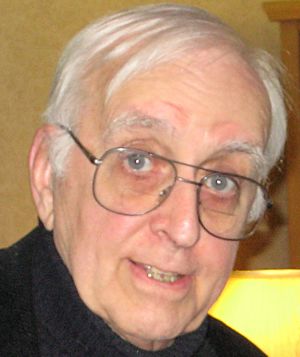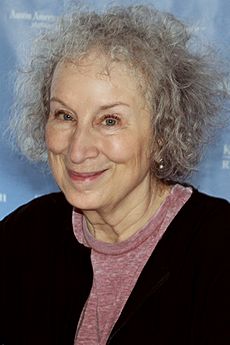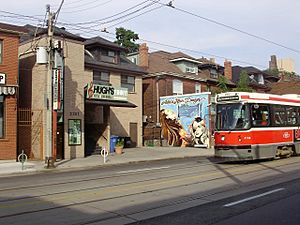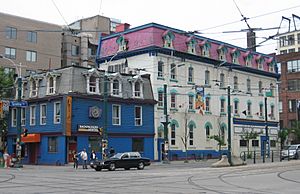Bohemian Embassy facts for kids
The Bohemian Embassy was a coffeehouse and cultural venue in Toronto, Canada, that opened in June 1960 and operated continually in different sites and formats until the early 1990s. Comedian and actor Don Cullen was associated with the establishment throughout its existence. Various aspects of culture were showcased, including jazz and folk music, poetry and theatre. The venue hosted performances by artists such as Milton Acorn, Margaret Atwood, sean o huigan, Sylvia Tyson, Gwendolyn MacEwen, David Essig, Martin Bronstein, Michael Boncoeur and Paul K. Willis. The legacy of the venue was examined in Bravo!'s 2010 documentary Behind the Bohemian Embassy. The "Bohemian Embassy" name has been appropriated by a condominium building in the Queen Street West area of Toronto, and a new wave rock group.
The venture began when some junior CBC employees sought an alternative to the Celebrity Club, a gathering place across the street from the broadcaster's production centre on Jarvis Street. Five each put up one hundred dollars: Don Cullen, David Harriman, Ted Morris, Peter Oomen, and Steven Thomas Quance. Another, "Larry," had offered to match any contributions, but pulled out when his ideas for the venue did not match the plans for a cultural salon that Cullen proposed.
The partners rented a third-floor loft, in the 1907 William Wilson Livery Storage Building, at 7 St. Nicholas Street, a laneway running north of Wellesley Street and one short block west of Yonge Street. It was near the University of Toronto and on the edge of Toronto's bohemian enclave and art district, the Gerrard Street Village. The name, the Bohemian Embassy, had previously been given a flat that three young writers, Harriman, Warren Wilson, and Michael John Nimchuk, occupied nearby, at 590 Yonge. The venue walls were whitewashed, and the floor painted dark red, and the club was first equipped with two large coffee percolators, later leasing a Gaggia espresso machine, reputedly one of the first in Toronto. Membership cost twenty-five cents, and admission one dollar, and within one year the Bohemian Embassy reported a membership numbering about 3,000.
The Bohemian Embassy opened on June 1, 1960, the performers including folk singers Karen James and Bob Wowk, and a jazz duo, drummer Paul Neary, and reed player Brian Westwood. The two players then led groups in residence that played midnight sets on alternating Saturdays.
The Bohemian Embassy quickly became a key venue for Toronto's younger poets, musicians—principally folk, jazz, and blues—alternative theatre, and satirical revues. Generally, poetry was programmed on Thursday evenings, folk music on Fridays, jazz on Saturdays, including a midnight set, and a hootenanny on Sunday nights.
Poetry readings were frequently punctuated by musical performances.
Gwendolyn MacEwen began reading her poetry at the Bohemian Embassy while she too was still a teenager. Other younger poets associated with the club included George Miller, Dennis Lee, and John Robert Colombo, who organized the poetry reading series. As well, the venue attracted poets of earlier generations, including James Reaney, Phyllis Webb, Margaret Avison, Al Purdy, and Jay Macpherson, and Raymond Souster ran poetry workshops at the club.
Folk music was a mainstay of the Bohemian Embassy, and, as a popular trend of the moment, a money-maker. Mary Jane and Winston Young had a Friday-night residency for several years. In addition to Sylvia Fricker's regular appearances, Ian and Sylvia later performed regularly, once bringing their manager-to-be Albert Grossman to hear them play a set. Gordon Lightfoot appeared when playing in a duo called the Two Tones. While still a student, Amos Garrett accompanied Embassy regular, folk singer Chick Roberts, and they soon joined with Carol Robinson, who appeared in revues at the club, and Jim McCarthy to form a band, the Dirty Shames. The Halifax Three, featuring Denny Doherty, played the club, while in Toronto adding guitarist Zalman Yanovsky to the lineup. They later joined forces with Cass Elliot in a group called the Mugwumps, which led Doherty into the Mamas and the Papas and Yanovsky to the Lovin' Spoonful. A few years into the coffeehouse's life on St. Nicholas, responsibility for booking folk music was given to Mitch Podolak, later co-founder of the Winnipeg Folk Festival, and he signed Joni Mitchell to perform at the Embassy.
In addition to burgeoning, homegrown Canadian talent, the Bohemian Embassy was a Toronto venue for higher-profile performers, often booked to play Wednesdays through Sundays, among them, from the United States, the Rev. Gary Davis, Mike Seeger, Len Chandler, as well as Canadian Bonnie Dobson.
In 1991, he Bohemian Embassy moved to a second-floor loft on Queen Street West, then a hub of Toronto's art and music scene. Cullen collaborated with Embassy habitué George Miller, singer-songwriter Michal Hasek, classical musician Eun-Jung Yoo, and stage manager Dan O'Reilly to start the new enterprise.
The performance space, which seated a reported 275, opened on June 20, 1991, with a cover charge of five dollars, for a reading by Al Purdy. Other veteran writers read there, including an evening in August 1991, when Margaret Atwood launched her book Wilderness Tips, that turned away about 150, but programming overall stressed younger and newer talent.
When the lease expired, after less than a year of operation, the Embassy closed, on May 9, 1992. Keller moved the reading series to the Spadina Hotel, and, optimistically, Cullen claimed that he was seeking a new location, but this turned out to be the final edition of the Bohemian Embassy as a coffeehouse and site of cultural production.





